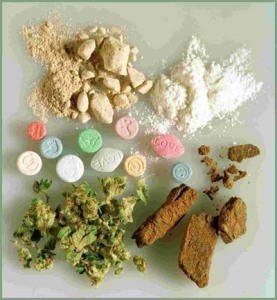F.S. § 893.13 provides that a person may not sell, manufacture, or deliver, or possess with intent to sell, manufacture, or deliver, a controlled substance. The penalties can be a felony or misdemeanor depending on the type and quantity of controlled substance you possess, among other things such as selling on a school, church, or nursing home grounds.
 F.S. § 893.03 lists the controlled substances and how they are classified under Florida law.
F.S. § 893.03 lists the controlled substances and how they are classified under Florida law.
- Schedule I: Drugs that have a high potential for abuse and have not currently accepted medical use. Some examples include Heroin, LSD, Peyote, PCP, and MDA.
- Schedule II: Drugs that have a high potential for abuse and have a currently accepted but severely restricted medical use. Abuse of these drugs may lead to severe psychological or physical dependence. Some examples include Opium, Morphine, Oxycodone, Codeine, Methamphetamine, and Hydrocodone.
- Schedule III: Drugs that have a potential for abuse less than substances contained in Schedules I and II and have a current accepted medical use in treatment. Abuse of these substances may lead to moderate or low physical dependence or high psychological dependence or, in the case of anabolic steroids, may lead to physical damage. Some examples include anabolic steroids, ketamine, and dronabinol (synthetic THC or Marinol).
- Schedule IV: Drugs that have a low potential for abuse relative to the substances in Schedule III and have a currently accepted medical use in treatment. Abuse of these substances may lead to limited physical or psychological dependence relative to the substances in Schedule III. Some examples include Alprazolam (Xanax), Clonazepam (Klonopin), Diazepam (Valium), and Lorazepam (Ativan).
- Schedule V: Drugs that have a low potential for abuse relative to the substances in Schedule IV and have a current accepted medical use in treatment. Abuse of these drugs may lead to limited physical or psychological dependence relative to the substances in Schedule IV. Examples include narcotic drugs and stimulants such as Subutex (Buprenorphine), Thymergix (Pyrovalerone), and Tylenol 4 and other drugs that contain small amounts of codeine or narcotics.
Contact an experienced Jacksonville criminal defense attorney to find out your rights in a drug case. Contact the Law Office of David M. Goldman, PLLC for a consultation.
 Jacksonville Criminal Defense Lawyer Blog
Jacksonville Criminal Defense Lawyer Blog

